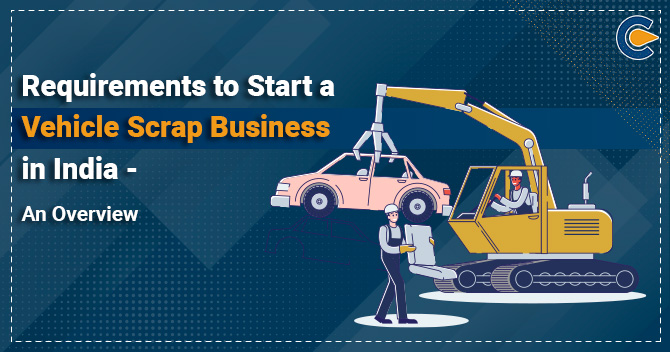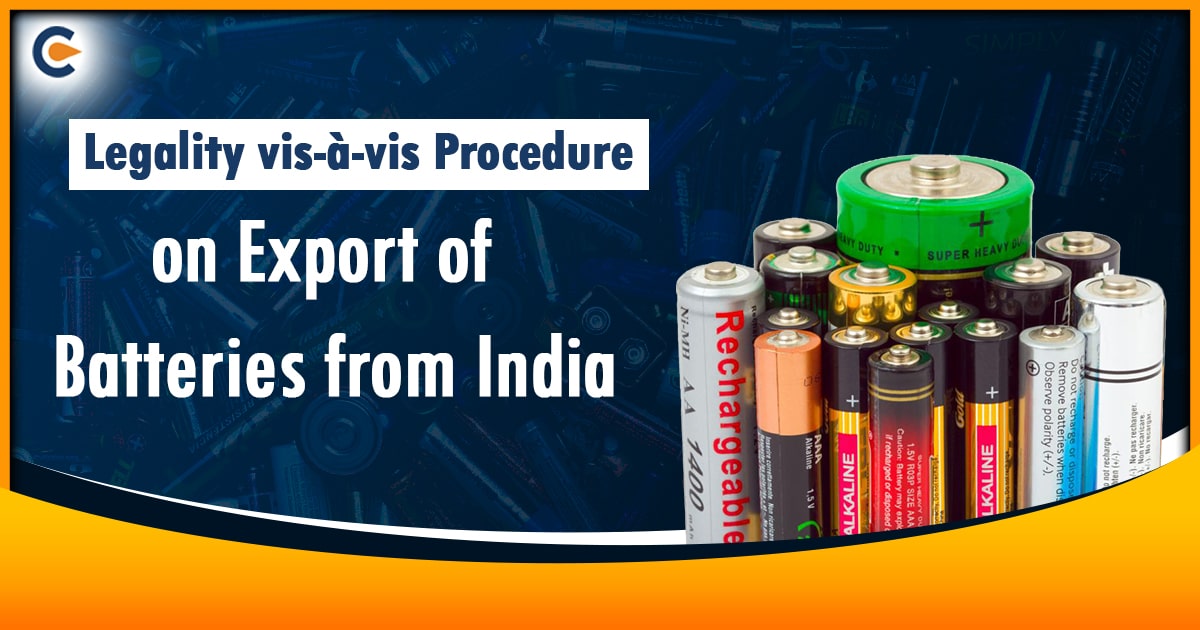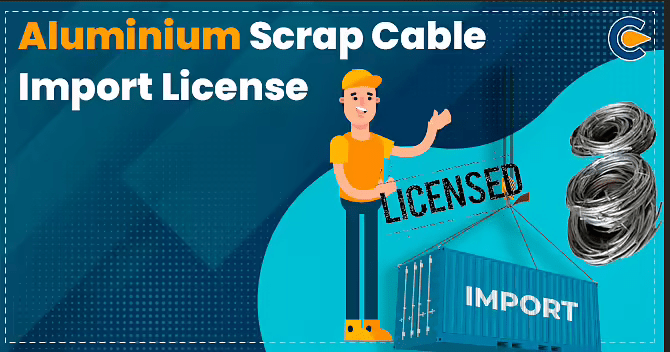Under Section 59 of the Motor Vehicles Act, 1988, the Government of India notifies some requirements to start a Vehicle Scrap Business in India. Such requirements will be applicable only for: vehicles which are no longer validly registered under Section 42 of the Motor Vehicles Act; or where the owners are desirous of scrapping their vehicles or the enforcement authorities, in the exercise of their powers, can scrap the vehicles seized by them or in accordance with any court’s directions. In short, the requirements for setting up a Vehicle Scrap Business in India apply to all the vehicle categories and their last registered owners, Automotive Dismantling, Automobile Collection Centres, Scrapping & Recycling Facilities & recyclers of all types of automotive waste items. In this blog, we are going to discuss some requirements to start a Vehicle Scrap Business in India.
Regulations Applicable to Vehicle Scrap Business in India
Following are some regulations applicable to Vehicle Scrap Business in India:
- Indian Panel Code, 1860;
- The Motor Vehicle Act, 1988;
- Various State & UT Motor Vehicles Rules, 1993;
- The Batteries (Management & Handling) Rules, 2011 as amended 2016;
- The Ozone Depleting Substances (Regulation & Control) Rules, 2000;
- The Central Motor Vehicles Rules, 1989;
- The E-Waste (Management & Handling) Rules, 2016;
- The Hazardous Waste (Management, Handling, and Transboundary Movement) Rules, 2008 as amended from time to time;
- The Plastic Waste (Management & Handling) Rules, 2011 as amended 2016.
Eligibility Conditions for Setting up a Vehicle Scrap Business in India
The conditions for the grant of authorisation for the treatment of end of vehicles’ life in an Authorised Vehicle Scrapping Facility or AVSF may be promulgated by the UT Governments or respective State Governments, keeping the following considerations:
- The Authorised Vehicle Scrapping Facility may be operated & owned by any entity, i.e., a firm, an individual, trust or society established in accordance with the laws.
- The entity must have:
- COI (Certificate of Incorporation);
- Valid PAN;
- Valid GST Registration.
- The entity:
- Should have experienced workforce and valid equipment to carry out the dismantling & de-pollution activities in a safe & environmentally responsible manner;
- Shall undertake to get the required quality certifications of ISO 9001 or ISO 45001 or ISO 14001 within 12 months of commencement of operations;
- Should be in possession of security certifications for the IT Systems for safe access to the VAHAN database;
- Should have an environmental management plan for the facility;
- Should possess or provide an undertaking to get a No Objection Certificate (NOC) of the State Pollution Control Board (SPCB) within a period of 6 months from commencement of operations;
- Should provide evidence of the availability of a useable treatment area of a minimum of 4000 sqm (for the treatment of Category L Motor Vehicles, including Category L, M, N and other vehicles) of land in the Orange category industrial zone of the State or UT by way of, agreement or ownership to sell/agreement for long term lease of a minimum period for which the license is sought;
- Should provide the approved building plan & plant layout;
- Shall undertake to fulfil the minimum technical requirement for collection & dismantling centres specified as per guidelines issued by the CPCB;
- Should undertake to stand by the Minimum Wages Act, EPF Act, Provisions of Labour Laws, Workmen Compensation Act, and all other Acts & Rules as are applicable;
- Should have applied for/be in possession of approval for Consent to Establish from the competent authority of the UT or State in which the AVSF is aimed to be located.
What are the Criteria for Vehicle Scrap Business in India?
Following vehicles may be facilitated for scrapping to the Authorised Scrapper:
- Vehicles which haven’t been issued a fitness certificate in accordance with Section 62 of the Act;
- Manufacturing rejects & tests vehicles as may be certified or authorised by the Vehicle OEM;
- Vehicles that have been declared obsolete/surplus/beyond economical repair by the State or Central Organisations of the Government and have been informed for scrapping;
- Vehicles which have outlasted their application or utility, particularly for projects on highways, farms, mining, power, etc., may be self-certified by the owner;
- Seized, abandoned, and auctioned vehicles by any Enforcement Agency;
- Vehicles which haven’t renewed their Original Certificate of Registration in accordance with Rule 52 of the CMVR[1];
- Vehicles which have been damaged due to natural disaster, riot, accident, fire, or any calamity, following which the registered owner self-certified the same as scrap;
- Vehicles bought by any agency comprising AVSF in an auction for scrapping the vehicles.
Documents Required from the Owner or the Authorised Representative
The Authorised Scrapper shall accept the FORM-2 and the applicable original documents from the owner or the Authorised Representative are as follows:
- Original Registration Certificate;
- Authorisation from the registered owner;
- Original Fitness Certificate;
- Certificate or order confirming the same of the vehicle of the registered owner accompanied with any proof of succession;
- It shall be examined that lease, hire-purchase, or hypothecation agreement in the Registration Certificate of a vehicle required under Sub-section (2) of Section 51 of the Motor Vehicle Act has been duly discharged;
- Certificate or order confirming the vehicle sale in a public auction in their favour duly signed by the individual certified to conduct the auction;
- In instance of inheritance, the Death Certificate of the actual registered owner accompanies any succession proof.
Also, the Authorised Scrapper shall accept the copies of the following documents from the owner or through an authorised representative:
- Copy of the owner’s PAN Card;
- Crossed cheque of the owner’s bank account;
- Address proof of the owner like latest Water Bill, Land Line Telephone Bill, Electricity Bill, piped cooking gas, etc.;
- Digital photo of the actual owner or authorised representative physically handling over the ELC to the authorised Scrapper, or a photograph of the owner duly pasted in Form-2 and counter-signed by the owner;
- Id proof of the authorised representative (if required) such as Aadhar Card, Driving License, Passport, Voter Card, Photo Id issued by the Central or State Government Organisations.
Some Basic Requirements to Start a Vehicle Scrap Business in India
Following are some basic requirements to start a Vehicle Scrap Business in India:
Right to Inspection:
- In order to make sure compliance with guidelines, the Authorised Scrapper should keep the AVSF, the records and registers recording the transaction of vehicles and scrap generation & its responsible disposal to authorised recyclers, and all the equipment, apparatus, and machinery in the AVSF premises, ready for inspection by the Designation Office or Licensing Authority of the State or UT Government.
- Physical Site & Inspection visits should only be carried out:
- When a report of non-compliance by the valid authority or a public complaint has been received by the Licensing Authority concerning Authorised Scrapper;
- Such complaint has been forwarded to the Scrapper to file a written response within three working days;
- The response has been examined and an opportunity is given to the Scrapper to provide further clarifications within 3 working days;
- The clarifications & response given are insufficient in the opinion of the Licensing Authority and a site inspection is warranted;
- Such site visits must be duly authorised or certified by the Licensing Authority or the designated officer in the State or UT Government.
Installation of CCTV Cameras:
- The Authorised or Certified Scrapper shall install CCTV cameras at the scrapping yard, in the customer & vehicle reception area. The scrapping record should be saved in the Authorised Scrapper’s IT System for a period of 3 calendar months;
- Access to the CCTV cameras installed in the facility may be given to the authorised or certified agencies as may be declared by the UT or State.
Scrapping Yard:
- In view of the large size and voluminous nature of the scraps to be handled, the dismantling facility should be establish in a large area having enough space for vehicular movement, as well as storage for the ELVs or products received and recyclable material removed.
- To make sure that safe operating practices are followed, Centres are expected to follow occupational Health & Standards, ISO 45001. All Centres shall engage trained & skilled manpower to process the End of Life vehicles, products and other scraps.
- The facility should be equipped with a de-pollution system, preferably with a zero discharge system and dismantling work shall be done by making use of the best available technology for processing the end of life vehicles, products and other scraps. The facilities shall comply with relevant health & safety regulation & environmental norms as laid down by MoEF and SPCB or CPCB for such operations & Hazardous & Other Wastes (Management & Transboundary Movement) Rules, 2016.
- It must fulfil the criteria of an enough gated area to handle, de-pollute, and dismantle ELVs, white goods and other scraps, and a facility for measuring radiation as is followed for import of scrap. ELVs shall require material handling machines to lessen human intervention and create safe workplaces.
- The Collection Centre should have dry areas (free from water logging), impermeable surfaces such as asphalt or concrete flooring and roads, enough workshop facilities for in-house maintenance, a fire protection system, etc., to maintain safe workplaces & all other measures for keeping pollution under control.
The Authorised Scrapping Yard should have:
- Appropriate safety and occupational health equipment;
- Suitable industrial-grade lighting & ventilation system;
- Certified de-polluting equipment to make sure zero leakage of pollutants during draining of fluids, fuels, liquids, and gases;
- Designated areas for storing scrap which occurs from the process, to cater to the material; specific downstream industries. No transport vehicles for carrying hazardous waste, spares, generated scrap are to be parked in public spaces;
- Radioactive detection equipment;
- All flooring should be non-permeable concrete or epoxy coated flooring;
- Training or practices area for trained & skilled manpower to manage such a facility in a proper and environmentally friendly manner;
- The Authorised Vehicle Scrapping Facility must have suitable effluent treatment plants or water recycling plants as needed for pollution-free operations;
- Conformity to noise pollution standards as may be specified from time to time;
- Clearly designated space for storage of automotive hazardous waste like batteries, oils, gases, tyres, fuel, and liquids;
- Material handling equipment for the safe transportation of scrap, spares, and waste products;
- Sufficient warehousing space for handling & storage of segregated spares that may be refurbished for reuse;
- Suitable dismantling equipment & best available technology for the activities, defined viz de-polluting, shredding, bailing, de-risking, dismantling, etc.;
- Certified de-risking equipment for safe neutralisation or removal of airbags, pre-tensioner, etc.;
- These scrapping yards should preferably accredit their centres or units with the latest version of quality standards viz. ISO 9001, ISO 45001, ISO 14001 within 12 months of commencement of operations.
- In case the Authorised Vehicle Scrapping Facility don’t have enough capability or provisions for responsible recycling of hazardous waste or for recycling of scrap material, then such materials are to be sold to duly certified agencies or recyclers who have enough licence and capability. A record of the transactions shall be maintained, clearly stating the volumes off-loaded and the name, PAN, GST, authorisation number, and other commercial details of the authorised agency or recycler.
Conclusion
In short, the requirements we discussed above for setting up a Vehicle Scrap Business in India is applicable to all categories of vehicles and their last registered owners, Automotive Dismantling, Automobile Collection Centres, Scrapping & Recycling Facilities and recyclers of all types of automotive waste items. These requirements shall come into force with effect from its notification date.
Read our Article:The Importance of EPR – An Overview











